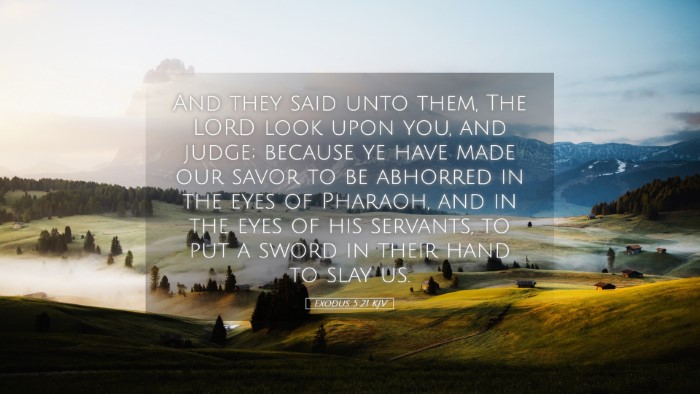Commentary on Exodus 5:21
Verse: "And they said unto them, The LORD look upon you, and judge; because ye have made our savour to be abhorred in the eyes of Pharaoh, and in the eyes of his servants, to put a sword in their hand to slay us."
Introduction
The Exodus narrative is pivotal in understanding God's deliverance of Israel from Egyptian bondage. Exodus 5:21 captures a critical moment following Moses and Aaron's first encounter with Pharaoh, resulting in an increased burden on the Israelites. This verse reflects the immediate impact of renewed oppression on the people of Israel, revealing their emotional and spiritual turmoil.
Insights from Public Domain Commentaries
Matthew Henry's Commentary
Matthew Henry observes that this verse reveals the bitter response of the Israelites to Moses and Aaron's mission. He notes the Israelites' complaint highlights a crucial transition in their perception of their leaders:
- Disappointment in Leadership: Henry emphasizes that the Israelites, initially hopeful for liberation, now feel betrayed as their conditions worsen. Their expectation that Moses and Aaron would deliver them quickly led to frustration when the opposite occurred. This disappointment serves as a reminder to leaders about the weight of expectation they bear.
- Divine Judgment: The phrase "The LORD look upon you, and judge" indicates the people's insistence that God must intervene in their suffering. While they express despair, they nonetheless appeal to God's justice, which reflects an understanding of their covenant relationship with the Almighty.
- Increased Oppression: Henry points out that the Israelites’ suffering intensified after Pharaoh's decree, as he implemented stricter measures in response to the relentless demands of Moses and Aaron. The suffering of the people represents a spiritual testing that precedes their eventual deliverance.
Albert Barnes' Notes on the Bible
Albert Barnes delves into the broader implications of this verse, highlighting both the psychological and theological dimensions of the Israelites' plight:
- Faith and Doubt: Barnes emphasizes the oscillation between faith in God and the despair of the people. They express a longing for God's intervention while becoming dubious about the promise of deliverance. This tension exemplifies the struggle within faith communities when confronted with hardship.
- Responsibility and Blame: The Israelites' condemnation of Moses and Aaron reflects a human tendency to assign blame during adversity. This highlights the accountability that leaders bear in spiritual and social contexts, revealing how leaders can sometimes inadvertently become scapegoats for communal hardships.
- Covenantal Faithfulness: Barnes points to the significance of the covenant in the Israelites' cry for judgment. They remember the promises of God but are currently unable to reconcile their experience of suffering with the divine promise of deliverance. Theologically, this underscores the relationship of reliance between God and His people.
Adam Clarke's Commentary
Adam Clarke's commentary provides additional insights into the historical and cultural context surrounding Exodus 5:21:
- Historical Context: Clarke notes that the Israelites were in a precarious position; facing Pharaoh's wrath, their reaction is both a plea for fair treatment and a lament about their dire circumstances. The mention of Pharaoh's sword metaphorically underscores the threat to their very lives.
- Human Emotion: Clarke emphasizes the raw emotional state of the Israelite leaders as they confront Moses and Aaron. Their desperation reveals a profound understanding of their conditions, filled with fear and hopelessness, resulting from a continuous cycle of oppression.
- Expectation and Fulfillment: Reflecting on their initial hope, Clarke discusses how the Israelites' expectations were misaligned with God's timeline for liberation. This tension serves as a reminder of the sometimes-unknowable nature of divine timing and purposes.
Theological Applications
This verse invites reflection on several theological concepts relevant to pastors, theologians, and students:
- The Nature of Leadership: Leaders in faith communities must be prepared for the realities of suffering and disappointment from those they lead. Genuine leadership requires both empathy and the courage to embody hope amidst despair.
- Faith in Times of Trial: The Israelites' cry highlights the importance of maintaining faith during periods of increased difficulty. It reminds believers that doubt and faith can coexist, urging a deeper dependence on God's promises.
- The Covenant Relationship: This verse serves as a reminder of the covenant nature between God and His people. Even in suffering, there is an underlying assurance of God's presence and eventual deliverance, evidencing His commitment to His promises.
Conclusion
Exodus 5:21 encapsulates the essence of human struggle in the face of oppression while laying bare the frustrations and fears surrounding leadership within the community of faith. The reflections from Matthew Henry, Albert Barnes, and Adam Clarke elucidate the multifaceted nature of this passage, offering timeless wisdom that resonates with individuals facing their trials today. Embracing both the pain and promise of this scriptural moment can fortify believers, encouraging them as they journey toward their own deliverance.


